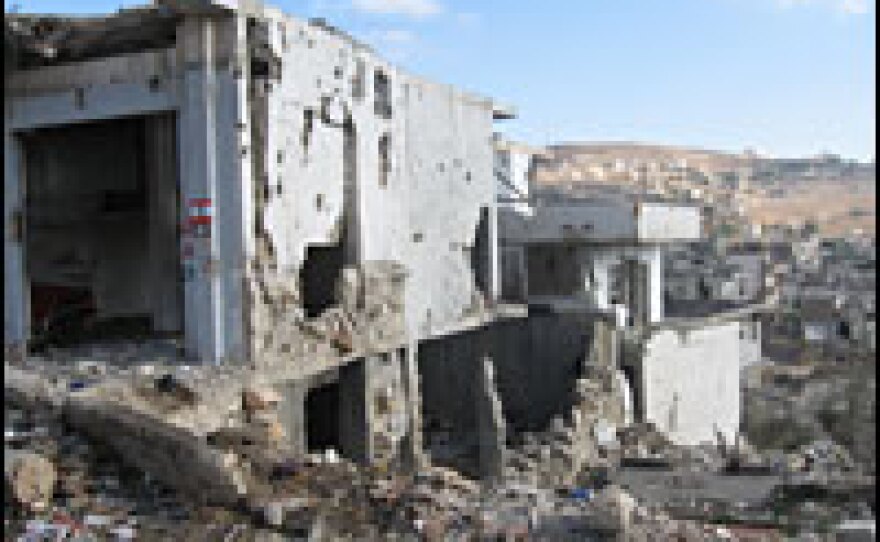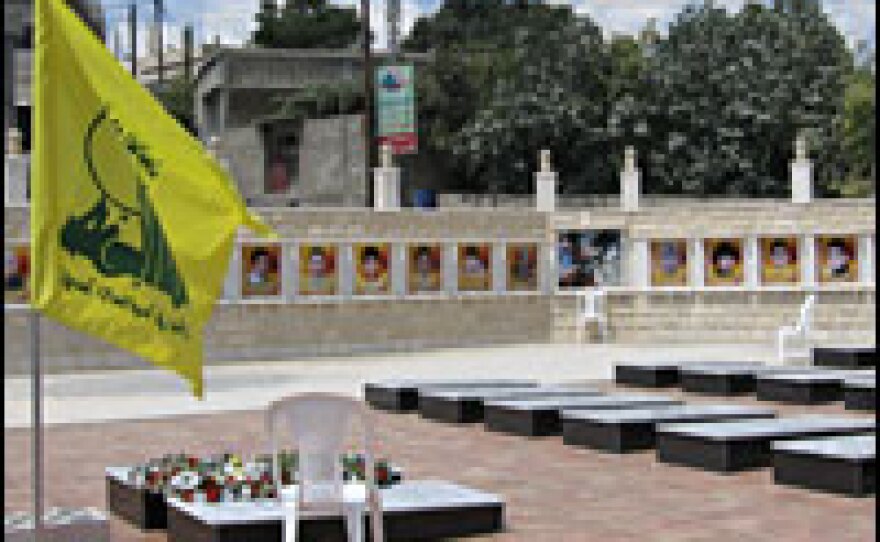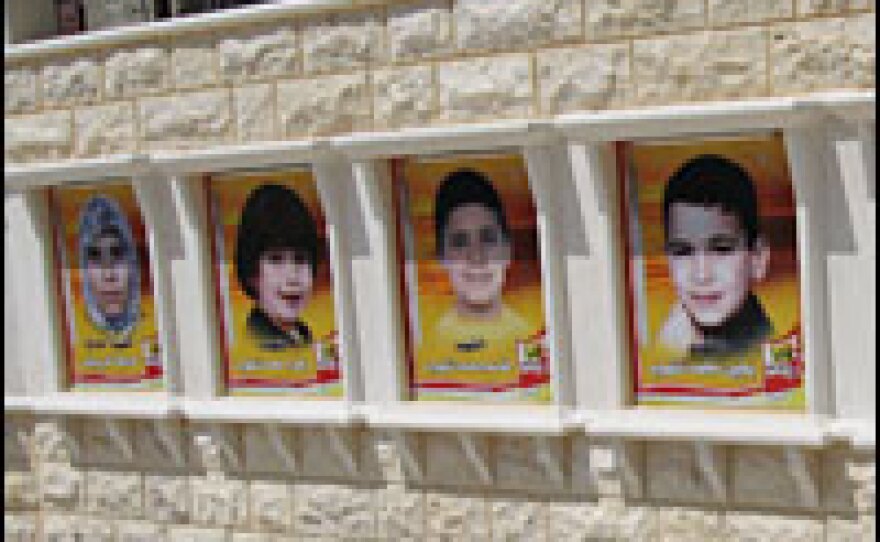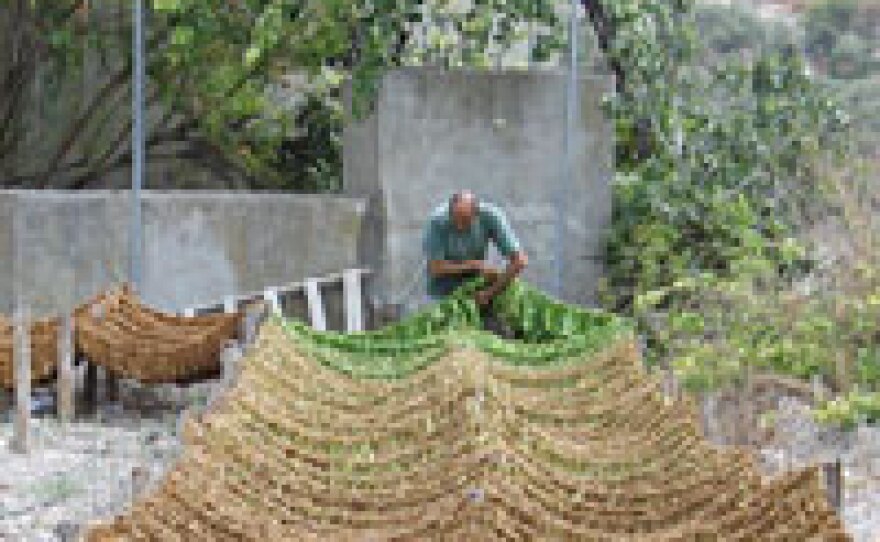



It has been a year since the end of the war between Israel and the Hezbollah guerrillas of Lebanon, a clash that lasted six bloody weeks.
The conflict erupted when Hezbollah guerrillas launched a cross-border raid, firing Katyusha rockets and capturing two Israeli soldiers. Israeli warplanes unleashed waves of airstrikes against Lebanon and sent troops and tanks across the border. Hezbollah retaliated by firing more Katyusha rockets at Israeli cities and towns.
By the time both sides agreed to a cease-fire, 158 Israelis had been killed, most of them soldiers. More then 1,200 Lebanese were also dead, the majority of them civilians.
Celebrating the 'Divine Victory'
A year later, Hezbollah is celebrating the anniversary of what it calls, "the Divine Victory." A new Hezbollah exhibit commemorating the conflict has been erected near the Shia movement's headquarters in the southern suburbs of Beirut.
The exhibit features life-size models of underground Hezbollah bunkers, pieces of a downed Israeli helicopter, photos of fighters firing Katyusha rockets, and an elaborate light show re-enacting a battle around a captured Israeli tank, placed under a tent at the bottom of large crater.
"We put this tank under the ground ... in order to let the people know and feel that the Israeli came to Lebanon, and he sink in Lebanon. Sink in the sands of Lebanon," explains Ali Ahmad, one of the exhibit's designers.
Also displayed here is Special Force 2, a combat video game designed for PC and Playstation by Hezbollah's Internet Bureau. The game features Hezbollah fighters carrying out missions to destroy Israeli tanks and helicopters.
"This game talks about the Lebanese resistance which wins the war," Ahmad says, adding that the game would be released in conjunction with Hezbollah's anniversary celebration of the war.
For the past 50 years, Arab countries have faced one humiliating defeat after another in wars with Israel. This time, Hezbollah's militia fought the Israelis to a bloody standstill.
For many Arabs, that's an accomplishment, says Timur Goksel, a former spokesman for the United Nations peacekeeping force deployed in southern Lebanon.
"This will be referred to as the day the Arabs regained their dignity," Goksel says.
The Cost of Victory
But the cost of this "victory" was enormous, particularly for Hezbollah's core supporters, Lebanon's Shia community.
In the Shia southern suburbs of Beirut, where plain-clothes Hezbollah agents on mopeds are quick to stop and interrogate visiting foreigners, demolition crews are still tearing down the shells of bombed-out apartment buildings.
Meanwhile, in battle-scarred southern Lebanon, entire villages have yet to be rebuilt. The reconstruction effort appears to be haphazard, in some areas led by Hezbollah, in others by the Lebanese government or by international donors, such as the European Union, Qatar and Iran.
Hezbollah constructed a cemetery in the hilltop village of Qana, which includes the photos of the 27 civilian victims of an Israeli airstrike.
On July 30, 2006, a bomb pancaked a house here where dozens of Lebanese women and children had been hiding in a basement. Most of those killed were children. Israel later justified the attack, by accusing Hezbollah of firing rockets from the village.
Some of the survivors now play in Qana's eerily empty streets.
"My sister died, and his brother Assim also died," said 5-year-old Hassan Ali Shalhoub, pointing to his 8-year-old cousin, Ali. The two boys were both dressed in Spiderman t-shirts, shorts and flip-flops. Both had scars on their faces from last summer's bombing.
"All the stones fell on us," Ali explains.
Nearby, a tobacco farmer named Youssuf Shalhoub, one of the boys' relatives, carefully hangs bunches of tobacco leaves on a line to dry outside his house.
"It's been a very difficult year for us," Shalhoub says. "You can shed two kinds of tears ... a sad tear for the massacre and what's happened to the village. But then again, maybe a tear of joy for the way that the Israeli project for the Middle East was halted through the war."
A half-hour's drive away, in the village of Mansouri, retired plantation worker Hani Srour and his wife Zahra were not celebrating Hezbollah's "divine victory."
"For us, it's not a victory," Srour says. "How can it be a victory when so much was destroyed and so many people were killed?"
Hezbollah did not build a memorial or a monument for Srour's son-in-law Darwish, or his son Mohammed, who had the misfortune of bringing his wife and German-born children on vacation to Lebanon from their home in Germany three days before the war broke out.
On July 23, after enduring the bombardment of Mansouri, the two men packed Mohammed's family in a car, and raced toward the nearby port of Tyre, where they hoped to catch a ship carrying foreign refugees to safety.
An Israeli missile struck the car, burning the two men to death and wounding several of the children.
12-year-old Mahmoud was severely burned on his face, chest and arms. He and his mother and siblings eventually escaped back to Berlin.After spending two months in a hospital there, doctors succeeded in saving Mahmoud's eyesight. The boy still has green scars from chemical burns on his face.
The grandparents, Hani Srour and Zahra, say that the two large families, one in Lebanon and the other in Germany, are now traumatized, fatherless and without sources of income.
"Nobody's helping us. The government hasn't helped us. Hezbollah hasn't helped us." Zahra says.
Aggravating Internal Tensions
Since the cease-fire, thousands of Lebanese army soldiers have been deployed to the southern border region for the first time in decades, serving alongside 15,000 United Nations peacekeepers.
But no one believes that Hezbollah's dedicated fighters have left the south.
"They [Hezbollah] call the shots, no doubt about it," said Timur Goksel, the former U.N. peacekeeper. "They can change the equation in South Lebanon in a matter of days."
Mohammad Shattah, senior adviser to Lebanon's prime minister, agrees. "We cannot control Hezbollah. Hezbollah is still an autonomous military force," he says.
Regional analysts say that last year's war failed to resolve any of the lingering disputes between Israel and Lebanon. Instead, the conflict aggravated internal Lebanese tensions. For the past 10 months, Hezbollah has led a sit-in in downtown Beirut, demanding the resignation of the Sunni-led, Western-backed Lebanese government.
"This, of course, has led to the sharpening of the Sunni-Shia faultlines," Shattah says.
"You've got a polarization in the country now that is much more intense than it was a year and a half ago," says Lebanese newspaper columnist Rami Khouri. "You've got a lot more people who are for Hezbollah or against Hezbollah, and there's very few people sitting on the fence now like there were before."
Copyright 2022 NPR. To see more, visit https://www.npr.org. 9(MDAzMjM2NDYzMDEyMzc1Njk5NjAxNzY3OQ001))







